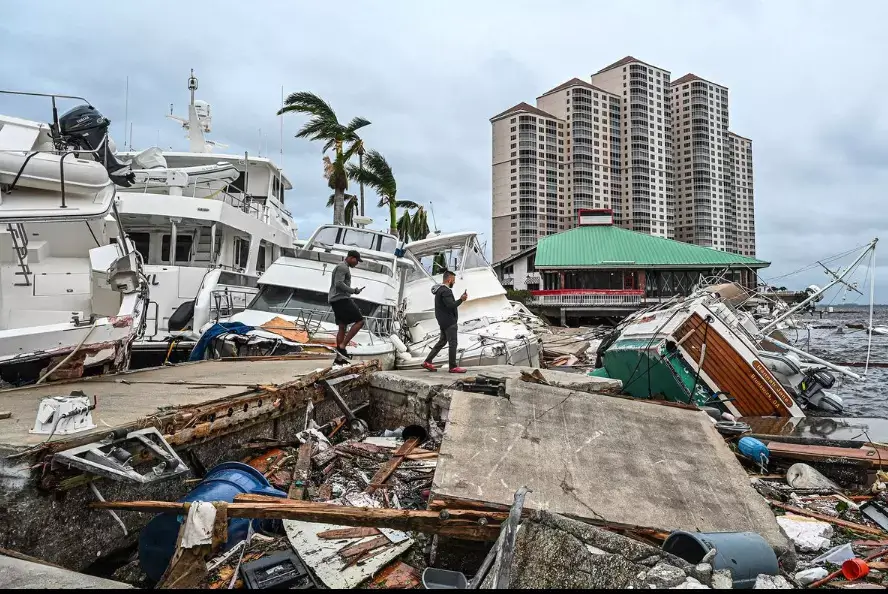Hurricane Ian, a Category 4 storm of massive proportions, devastated part of the Florida Gulf Coast, particularly the Fort Meyers and Naples area, and caused widespread flooding in other parts of the state. Born and raised in Florida, I have a lot of experience with hurricanes. At age 10, I was staying over with my grandparents in 1960 when Donna destroyed and severely damaged 6,000 homes. Hurricane Ian reminds us of many Bible lessons:
First, this is a world under judgment. When the first man sinned, God cursed the ground for his sake (Genesis 3:17-19). The Bible well says, “the whole creation groaneth and travaileth in pain together until now” (Romans 8:22). The Florida Gulf Coast is one of the most beautiful places on earth, but there is no paradise in this fallen world. Sorrow, trouble, pain, and death are everywhere. “Yet man is born unto trouble, as the sparks fly upward” (Job 5:7). “And as it is appointed unto men once to die, but after this the judgment” (Hebrews 9:27).
Second, God is in control of the weather. “… the LORD hath his way in the whirlwind and in the storm, and the clouds are the dust of his feet” (Nah. 1:3). The God who made the world is in control of the world. He created natural forces, but He has not left the earth to “nature.” He upholds all things, and by Him all things consist (Col. 1:17; Heb. 1:3).
Third, God’s mercy is operating in this fallen world. “The earth, O LORD, is full of thy mercy” (Psalm 119:64). Mankind has willfully sinned against God and doesn’t deserve any blessing, yet God is merciful. At great cost, by His Son God purchased salvation for sinners and is offering salvation as a free gift to those who repent and exercise saving faith in Jesus Christ. This is an act of unimaginable mercy and grace for those who have eyes to see.
Fourth, God answers prayer. One of my sisters informed me of the approaching storm a couple of days before landfall and we began praying for God’s mercy. Though they were in the very path the hurricane took across the peninsula, they were largely unaffected. The electricity didn’t even go out. I heard from other friends that their prayers were answered, and the governor of South Carolina credited prayer for helping his state.
Fifth, it is important to heed warnings. Sufficient warnings were given to evacuate the areas that were hardest hit, but some people stayed put and were killed. In 1980, Harry R. Truman famously refused to evacuate his home near Mt. Saint Helens in Washington state and died in the volcanic eruption. The most important warning to heed is the one issued by Jesus Christ: “except ye repent, ye shall all likewise perish” (Luke 13:3, 5).
Sixth, Ian reminds us that we had better live lightly on this earth and be ready to go at any moment. Many people were quoted by the media saying they had lost everything in a day that they had worked for over their entire lives. They were shocked and confused. It is truly amazing that men and women can live in this world, knowing that their lives are uncertain and brief at best, and yet make no clear plan for eternity and act surprised when death and destruction come.
Seventh, the really big “destructive nature events” are yet future. “And there were voices, and thunders, and lightnings; and there was a great earthquake, such as was not since men were upon the earth, so mighty an earthquake, and so great. … And every island fled away, and the mountains were not found. And there fell upon men a great hail out of heaven, every stone about the weight of a talent: and men blasphemed God because of the plague of the hail; for the plague thereof was exceeding great” (Revelation 16:18-21). One-fourth of the world’s population will perish in the very first part of the coming Tribulation (Revelation 6:8). The world’s emergency and health-care systems will be utterly overwhelmed.
(Friday Church News Notes, October 7, 2022, www.wayoflife.org fbns@wayoflife.org, 866-295-4143)
